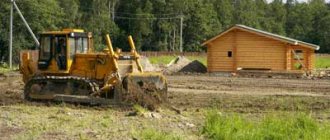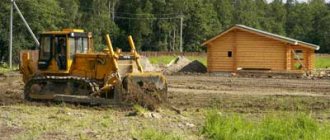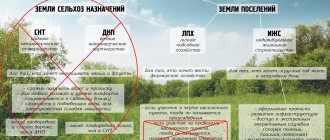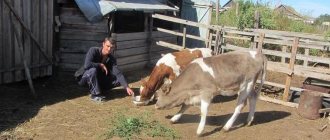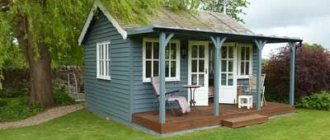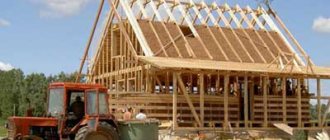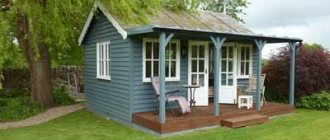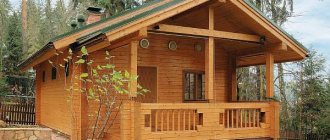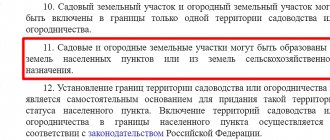Would you like to consult a lawyer for free? Write to the chat on the bottom right or call the hotline, calls within the Russian Federation are free. We accept questions any day of the week.
Some categories of land are designated for certain purposes and construction on them in 2021 is limited or completely prohibited. The question of whether it is possible to build a house on land for gardening interests many owners of such plots. It is regulated by Russian legislation and requires special consideration.
What can be built on gardening land
The rights of the owner of a land plot are determined by Art. 263 Civil Code of the Russian Federation and Art. 40 Land Code of the Russian Federation. To answer the question whether it is possible to build a house on land for gardening, you need to know that all permitted buildings are divided into several categories:
- Garden house. Unlike a residential building, it is intended only for temporary (seasonal) residence while maintaining the garden. There are no communications connected to it, and no heating is provided. You can live in such a house, but you cannot register (with the exception of areas located within the boundaries of a populated area). To change the category of a garden building to a residential building is possible only through the court, where you will have to prove that it fully satisfies all the requirements for comfortable and safe living. The garden house does not have a postal address.
- Agricultural buildings. They are designed to provide garden maintenance. From any materials, at the owner’s discretion, you can build: greenhouses for growing seedlings or heat-loving plants (can be equipped with a heating system); sheds (including with basements) for storing property and carrying out auxiliary work, as well as keeping pets and birds; hangars for storing crops and equipment; woodsheds for storing firewood. The purpose of the buildings being erected is to ensure the cultivation of garden crops and harvesting, storage of tools and equipment, storage of equipment and crops.
- Other buildings: garage, toilet, summer kitchen, bathhouse, etc. These non-permanent buildings should provide comfortable living for people while caring for the garden.
Read more about whether it is necessary to obtain a permit to build a bathhouse.
Important! Any buildings on gardening land cannot be used for commercial purposes. Taking this into account, production workshops, healthcare and cultural facilities, retail outlets (shops), infrastructure structures and other buildings for commercial use cannot be built on lands for gardening.
Dacha amnesty
Photo by Pexels
Since it was extended until March 1, 2026, this means that there is enough time to register the right to a residential country house if you started building it before August 4, 2018.
Until August 4, because it is from this date that permits for the construction of a private house must be obtained. Citizens must notify the municipal administration about when the house began to be built and when construction was completed.
If violations of urban planning standards are discovered, the administration simply refuses construction and summer residents have to get rid of these violations. It is important to remember that on garden plots the construction of houses with a height of more than 20 meters and more than 3 floors is prohibited.
To notify the local administration of your intentions, you need to send an application:
- by registered mail;
- personally;
- through MFC or STATE SERVICES.
On garden plots, only small buildings of this type can be erected, such as sheds, greenhouses, bathhouses, etc.
Garden plot status
The status of a horticultural plot determines the following purpose of the land:
- growing fruit trees and shrubs;
- cultivation of nut plants;
- planting and growing vineyards, berries and other fruit bushes;
- harvesting fruits for making juices and other drinks;
- cultivation of mushroom mycelium and harvest processing;
- growing seedlings and seeds for the purpose of breeding new species;
- growing decorative varieties of crops and vegetables, incl. for nurseries;
- cultivation of spice plants.
Land for gardening may have different status depending on the location of the site. If it is located outside a populated area, then, as a rule, it belongs to the category of agricultural land. Within the boundaries of a populated area, such a plot may be given the status of a household plot.
The question of whether it is possible to build a house on lands for gardening is decided taking into account the status. It is not allowed to build permanent buildings (with a foundation) on agricultural lands, and even a residential building can be built on personal plots after obtaining permission from local authorities.
In addition, land for gardening can be privately owned, when the owner can fully dispose of it, or as part of a horticultural non-profit partnership (SNT). In the latter case, the permitted use of land on a lease basis is ensured. The question of whether it is possible to build a house on SNT lands is agreed upon by the general meeting of owners.
Read more about how to register a house in SNT in our article.
Site care
There should be no garbage on the site - this is one of the main changes. 09.16.2020 - Mikhail Mishustin signed Resolution No. 1479 “On the approval of fire regulations in the Russian Federation” ; it came into force on 01.01.2021. You can punish those summer residents who have grass sprouting in their dacha or garden plot instead of beds. The only concession is that by the beginning of the warm season, it is not at all necessary for everyone to have a fire extinguisher or a barrel of water. But the number of responsibilities of summer residents has increased.
For example, paragraphs 68 and 69 deal with the ban on dumping waste in areas for public use, as well as in forests, suburban areas and agricultural areas.
Obtaining a building permit in 2021
No permit is required for the construction of permitted non-permanent buildings and a garden house. If the site belongs to SNT lands, then the owner is obliged to comply with the norms of Article 34 of Law No. 66-FZ (https://www.consultant.ru/document/cons_doc_LAW_18461/a716fd25e3cf9ba6d1b173acb5efae8f1e91ba3e/) and SP 53.13330.2011.
According to these documents, it is necessary to take into account the territorial land surveying project. All members of the SNT are required to have a Code of Development Rules, which is adopted at the general meeting of the partnership.
Permission in 2021 is required for the construction of a residential building on a site located in the territory of a populated area. To obtain it, the following documents are provided:
- document on the right of ownership or use of the site (extract from the Unified State Register, certificate);
- passport of the owner of the site;
- urban planning plan of the site;
- plot layout diagram indicating the location of the building for which permission is required.
Read more about how a permit to build a residential building is issued in our article.
An application addressed to the head of the local government body is submitted to the authorized municipal body with the specified documents attached. The decision is made within a month.
A garden house can be reclassified as a residential one by decision of local authorities or the court. Such permission can only be obtained by proving that the house meets the following requirements:
- The owner of the site has legal, sole ownership of the property, and the building is not mortgaged;
- During construction, all construction, sanitary, environmental and fire safety standards were observed, proof of which will require conclusions from relevant organizations;
- The house is provided with all necessary communications - electricity, water supply, sewerage, heating.
You can register in a house only after it has been recognized as residential.
Can the board develop its own regulations?
The management of SNT is obliged to develop a charter of the partnership, drawn up taking into account the norms of Law No. 217-FZ. These two documents (charter and law) are sufficient to regulate all aspects of the activities of any SNT. Local documents are not required, since in order to be legal, they in any case must duplicate the provisions of Law No. 217-FZ.
The procedure for payment and the amount of membership fees is also determined by Law No. 217-FZ and the charter. Payments are made only to the bank account.
In order to determine the boundaries of the SNT, there is land management documentation. Please note that only one SNT (ONT) can be created on the territory of one gardening or vegetable gardening area.
At the same time, land owners should keep in mind that joining the SNT is a voluntary procedure. Often this is more profitable for the summer resident himself, but if he does not have such a desire, then no one has the right to force him to join a partnership (Part 6 of Law No. 217-FZ).
To find out what the procedure for becoming a member of a gardening partnership is, follow the link to receive free trial access to K+. And if you want to leave the SNT members, then first find out the consequences of such a withdrawal. To do this, get a free trial access to the system.
Standards for the location of buildings on the ground for gardening
Certain restrictions on the location of buildings on the site are established by SNiP 30-02-97:
- from a residential building to the wall of a neighboring building there must be at least 3 m;
- to the premises with animals - at least 4 m;
- to outbuildings - at least 1 m;
- there should be at least 5 m to the road, and 3 m to the driveway.
- the wall must be removed from the border of the site or fence at a distance of at least 1 m.
- the distance between brick or stone structures must be at least 6 m, and between a stone (brick) and wooden structure - at least 10 m.
- wooden buildings are separated from each other at a distance of at least 16 m.
- from a residential building to a toilet, premises for animals and birds, settling tanks should be at least 12 m.
- There should be more than 8 m between buildings and a bathhouse, well, and septic tanks.
In general, on a gardening site, all buildings and paths should occupy no more than ¼ of the total area.
Fees for the needs of SNT
All funds for the needs of the gardening partnership must go to a bank account. This, in turn, creates difficulties for older people who do not know how to use bank cards or do not have bank cards at all.
In accordance with the adopted act, summer residents and gardeners are required to pay various fees. In addition to taxes, they must pay for general expenses and the work of members of self-government. All those who are not members of the SNT will pay 6% more than those who are members of the SNT.
Liability for violation of construction rules
Construction on lands for gardening and SNT without approval is recognized as non-intended use of land. Punishment for such an act is provided for in Article 71 of the Code of Administrative Offenses of the Russian Federation. At the municipal level, a fine of up to 2,000 rubles on the owner of the site at any time during construction or after its completion.
If payment is late, a double fine may be imposed. If execution is refused, the fine is collected through the Bailiff Service forcibly.
Houses built without approval are given the status of unauthorized construction. If the owner does not legitimize the building in the prescribed manner, the court issues an order to demolish the structure within a specified period at the expense of the owner.
Gardening plots are allocated for the intended use of the land. They can be used to build garden houses, agricultural and utility buildings of a non-permanent type. A residential building can only be built on a site within a populated area after agreement with local authorities. Unauthorized construction is recognized as an administrative offense and is punishable by a fine.
If you need advice, our land lawyer will help you.
Licenses for wells and wells
According to the new rules, gardeners and summer residents will have to obtain a license for wells and wells. It is not needed only if the well meets the following points:
- owner – an individual;
- it was not drilled into a centralized aquifer;
- used solely for personal interests;
- The amount of water lifted is no more than 100 cubic meters per day.
Since wells meet these requirements, in most cases only wells that are in common use will have to be registered.
Land allocation procedure
According to land legislation, every citizen of the Russian Federation has the right to receive a plot of land that is in state or municipal ownership. Land for vegetable gardening or horticulture can become the property of an individual or a non-profit association if it is registered with local authorities for this purpose.
The priority is determined on the basis of submitted applications.
If applicants have any benefits that give them a preferential right to receive a land plot, they are included in a separate list.
The authorized bodies, having determined the applicants' need for an allotment, taking into account the zoning schemes of the territory, offer one or another type of land or decide to refuse to issue it.
The plot is provided as a property or on the basis of other property rights.
In accordance with the procedure established by law, a fee is charged for the transfer of land into ownership, which cannot be higher than the standard price of the plot. In other cases, no payment is provided.
Restrictions on the use of plots for gardening and vegetable gardening
The permitted use of land for gardening and vegetable farming has some restrictions regarding:
- type of construction. It should not be intended for permanent residence;
- type of land. As a rule, this applies to agricultural areas, but this may also include settlement lands;
- the size of a permanent structure - no more than 25% of the total size of the site;
- use of at least part of the plot for its intended purpose, for example, for growing crops.
Features of the new law on gardening and vegetable farming partnerships
- New organizational forms of non-profit associations of citizens for running countryside farming
- Is it necessary or not to change documents for legalized objects during the transition period and after?
- Register of partnership members
- The principle of territorial subordination of partnerships
- Common property in SNT and ONT
- Transactions with shares in the right of common ownership of common property
- Contributions to SNT and ONT
- What is allowed to build on garden and vegetable plots?
- On the construction of water wells in gardens and vegetable plots
- Forms of support by state authorities and local governments for gardening and vegetable gardening
Reasons for issuing a new law that changed the status of suburban non-profit associations of citizens
The Federal Law “On the conduct of gardening and vegetable gardening by citizens for their own needs and on amendments to certain legislative acts of the Russian Federation” (hereinafter referred to as the new law), adopted at the end of July 2021 (No. 217-FZ), even by its name indicates future changes caused by its appearance. 39 previously adopted legislative acts will be subject to changes and additions at once. Apparently, for this reason, the date for the entry into force of the new law has been postponed until January 1, 2021, with the establishment of a transition period of 5 years from the date of entry into force for the completion of certain reorganization procedures.
The main goal of the new law, which will replace the still in force Federal Law “On gardening, vegetable gardening and dacha non-profit associations of citizens” (No. 66-FZ), can be considered as an attempt to resolve the situations that have arisen in the “dacha sector” of the country, in which, somewhere 60 million gardeners, summer residents and market gardeners are working successfully, sometimes not very effectively, for their own benefit, and this, no less, is practically half of the Russian population.
The most painful problems that cause great criticism, as legislators found out when preparing the law, which began in 2014, were the following:
- multiplicity of organizational forms of dacha and gardening associations (DNP, SNT, various horticultural and dacha cooperatives and other options, all together representing 9 independent legal forms of non-profit associations of citizens created to conduct country farming),
- malicious extortions in the form of membership and other types of fees, which are not uncommon for many gardening and dacha partnerships,
- past administrative persecution for the construction of residential buildings on garden and dacha plots, and, accordingly, the impossibility of registration (registration) in capital buildings erected on plots that are absolutely suitable for living,
- the high cost of drilling and constructing water wells in gardening or in individual areas, the cost of which amounts to impressive amounts (from 1 million rubles to 2.5 million rubles) and without which, in the absence of a centralized water supply, staying at dachas becomes simply unthinkable,
- lack of real support from municipalities for existing and emerging new dacha and garden partnerships to provide them with utilities.
New organizational forms of non-profit associations of citizens for running countryside farming
The new law excludes such a legal organizational form of citizens' associations as a “dacha non-profit partnership.”
The new law eliminated the artificially formed and still existing distinction between dacha and gardening partnerships created in accordance with the already mentioned Federal Law “On horticultural, gardening and dacha non-profit associations of citizens”, and established only 2 types of legal status of country associations of citizens:
- gardening non-profit partnerships (SNT),
- gardening non-profit partnerships (ONT).
The rights of individuals who do not wish to enter into a partnership are set out below. In the meantime, let's look at what's new in SNT and ONT.
A gardening non-profit partnership and a gardening non-profit partnership are types of partnership of real estate owners.
New garden and vegetable plots of land, as before, are formed from the lands of settlements or from agricultural lands. Each garden or vegetable plot of land can be included within the boundaries of only one gardening or vegetable gardening territory.
Gardening or gardening on garden plots located within the boundaries of the partnership territory can be carried out by the owners of the plots in the following organizational and legal forms:
- with participation in partnerships,
- without participation in partnerships.
In accordance with the new law, it is established that a partnership can be formed with a minimum number of members of 7 people (Part 2 of Article 16 of the new law). If the requirement for the number of members of the partnership is not met, then such a non-profit association may be liquidated by a court decision:
- at the claim of a state authority of a constituent entity of the Russian Federation,
- at the request of the local government body at the location of the gardening or truck farming territory,
- at the claim of the owner or copyright holder of a garden or vegetable plot located within the boundaries of the gardening or vegetable gardening territory.
Upon liquidation of a partnership, the property of common use of the partnership (with the exception of real estate of common use owned by the partnership and remaining after satisfaction of the creditors' claims) is transferred to the owners of plots located within the boundaries of the territory of SNT or ONT, in proportion to their area, and regardless of whether they were whether these persons are members of the partnership (clause 1 of Article 28 of the new law).
The law also defines provisions regarding:
- grounds and procedure for admission to membership of the partnership,
- rights and obligations of members of the partnership,
- grounds for termination of membership;
- rights and obligations of the management body of the partnership.
Several chapters and articles of the law are devoted to these issues, including Article 8, which reveals the main provisions of the Charter of the partnership.
The supreme body of the partnership is the general meeting of its members. It is valid if more than 50% of the members of the partnership are present at the meeting.
The governing body of each of the new types of partnerships is, in general, the same body, but with partially changed powers:
- chairman representing the sole executive body,
- the board, which is a permanent collegial executive body with a maximum number of at least 3 people, but no more than 5% of the number of members of the partnership, which not only creates a certain convenience in the “controllability” of the board itself by the members of the partnership, but also reduces the size of the membership contributions for the maintenance of a board with a reduced number of members,
- audit commission (auditor), accountable to the general meeting of members of the partnership.
The board of the partnership is accountable to the general meeting of SNT or ONT. The management body will be elected for 5 years, and not for 2 years, as now and until 01/01/2019. Despite the noticeably longer term of its powers, by decision of the general meeting of members of the partnership, the chairman or negligent members of the board can be removed for unsatisfactory work and re-elect at any time due.
A meeting of the board of a partnership is valid if at least half of its members are present. Decisions of the board of the partnership are made by open voting by a simple majority of votes of the present members of the board. In case of equality of votes, the vote of the chairman of the partnership is decisive.
Possibility of changing SNT on HOA
By decision of the general meeting of SNT members, owners of garden plots have the right to change the existing type of association to a homeowners' partnership (HOA). The organizational and legal form of the partnership of real estate owners in this case does not change, but the main requirement for such a procedure is the compliance of the HOA with the norms of the housing legislation of the Russian Federation, which regulates the creation of an HOA with the simultaneous satisfaction of the following conditions:
- the gardening area is located within the boundaries of the populated area;
- Residential buildings are located on all garden plots located within the boundaries of the gardening territory.
Changing the type of gardening non-profit partnership (SNT) to a homeowners' partnership (HOA) is not considered a reorganization (clause 2 of Article 27 of the new law).
Possibility of changing SNT or ONT to another type of partnership activity
A gardening or vegetable gardening non-profit partnership can change its type of activity, again by decision of the general meeting:
- for the production, processing and marketing of crop products,
- other activities not related to gardening and vegetable farming and allowing the creation of a consumer cooperative.
The creation of a production cooperative is a reorganization of the previous organizational and legal form of SNT or ONT (clause 1 of Article 27 of the new law), and therefore requires amendments to the Unified State Register of Real Estate.
Is it necessary or not to change documents for legalized buildings during the transition period and after?
For the transition period, which will last 5 years, that is, until January 1, 2024, the new law established the following provisions:
- DNP, dacha cooperatives, dacha farms, gardening partnerships and other non-profit organizations of citizens created before January 1, 2021 do not need to be reorganized.
- From 01/01/2019, the requirements of the new law will be applied to all previously created horticultural or dacha non-profit partnerships, as well as gardening non-profit partnerships, even before their charters are brought into compliance with the new law:
- or in accordance with the provisions on horticultural non-profit partnerships,
- or in accordance with the provisions on gardening non-profit partnerships.
- The introduction of the constituent documents of gardening or dacha non-profit partnerships and gardening non-profit partnerships created before the introduction of the new law is carried out after the new law comes into force through the introduction of amendments:
- in the constituent documents (title, charter and other documents) and registration of these changes in the Unified State Register of Real Estate,
- changing the names of non-profit associations is not required, but can be carried out at the request of interested parties,
- changing names does not require changes to title and other documents containing their previous names.
- Buildings on garden plots registered in the Unified State Register of Real Estate before 01/01/2019 with the designation “residential”, “residential building” are recognized as residential buildings:
- replacement of previously issued documents with those registered in the Unified State Register until 01.01. 2021 buildings or changes to the documents on them, changes to the Unified State Register of Real Estate, as well as replacement of the names of real estate objects are not required,
- Replacement of documents and names of buildings can be carried out at the request of the copyright holders of real estate objects.
- Non-residential buildings located on garden plots, buildings for seasonal use, intended for recreation and temporary stay of people and not being outbuildings and garages, registered in the Unified State Register of Real Estate before 01.01. 2021, recognized as garden houses:
- replacement of previously issued documents with those registered in the Unified State Register until 01.01. 2021, the specified buildings or changes to the documents for them, changes to the Unified State Register of Real Estate, as well as replacement of the names of objects are not required,
- Replacement of documents and names of listed buildings can be carried out at the request of their copyright holders.
Register of partnership members
The distribution of plots between members of the partnership is carried out on the basis of a decision of the general meeting of members of the partnership in accordance with the register of members of the partnership.
Garden and vegetable plots of land that are in state or municipal ownership are provided to citizens free of charge in cases established by federal laws and laws of constituent entities of the Russian Federation.
The register of partnership members must be formed within 1 month from the date of state registration of SNT or ONT in the Unified State Register of Real Estate (Article 15 of the new law). The register is created by the chairman of the partnership or an authorized member of the board.
The register of members of the partnership contains the following information:
- about the members of the partnership,
- cadastral (conditional) number of each land plot, the owner of which is a member of SNT or ONT (after the distribution of land plots between members of the partnership).
Members of the partnership are required to provide reliable information necessary for maintaining the register and promptly inform the chairman of the partnership or an authorized member of the board of changes in information.
Failure to comply with the requirement to provide information, a member of SNT or ONT bears the risk of imposing on him the costs of the partnership associated with the lack of up-to-date information in the register.
The principle of territorial subordination of partnerships
The law introduces the principle of territorial subordination, which prohibits the operation of several partnerships with common infrastructure and one common area on the same territory. In other words, a garden partnership cannot appear within a garden partnership.
The goals of introducing this principle are quite obvious:
- eliminating situations of “pulling” advantages in the use, for example, of a transformer booth owned by one legal entity and a fire reservoir owned by another legal entity, that is, located on the territories of different legal entities (partnerships), but providing electricity and water to each of these partnerships ,
- establishment of legal relationships between partnerships for the use of engineering infrastructure and public areas,
- management of common property within the boundaries of the gardening or vegetable farming territory can be carried out by only one partnership.
Since the entry into force of the new law, owners of garden or vegetable plots of land located within the boundaries of the territory of SNT or ONT have the right to create only one gardening or vegetable gardening non-profit association. Its boundaries must be determined in accordance with the territory planning documentation:
- documentation on the planning of the territory, before its approval by the municipal authorities, must be approved by a decision of the general meeting of members of the partnership,
- preparation and approval of a territory planning project for a vegetable gardening partnership is not required, and the establishment of the boundaries of garden land plots and the formation of garden land plots and general purpose land plots within the boundaries of the ONT territory are carried out in accordance with the approved land surveying project.
- When preparing documentation on territory planning for a partnership, the boundaries of the gardening or market gardening territory include land plots that simultaneously meet the following requirements:
- the plots are owned by the founders of the partnership,
- the plots constitute a single, inextricable element of the planning structure or a set of elements of the planning structure located on the territory of one municipality.
When forming new gardens and vegetable gardens and preparing documentation for the planning of their territory, the boundaries of their territories also include:
- plots that are state or municipally owned and not provided to citizens and legal entities (their total area must be at least 20% and no more than 25% of the total area of garden or vegetable plots of land falling within the boundaries of the horticulture or vegetable gardening territory),
- plots and territories for public use, defined in accordance with land legislation and legislation on urban planning activities (the formation of land plots for general use is carried out in accordance with the approved land surveying project).
It is prohibited to establish boundaries of gardening or vegetable gardening territories that limit or terminate free access from other land plots to public areas or to public land plots located outside the boundaries of the territories of partnerships being formed.
Common property in SNT and ONT
One of the tasks of SNT and ONT is the management of common property located within the boundaries of the gardening or truck farming territory and owned by the members of the partnership.
General use property located within the boundaries of the territories of horticultural or gardening associations includes real estate that simultaneously meets the following 2 conditions:
- the property was created or acquired after the entry into force of the new law,
- this property belongs to the owners of land plots on the right of common shared ownership in proportion to the areas of their plots.
Such property, represented by capital construction projects and general purpose land plots, is used exclusively for the needs of gardeners and gardeners.
The list of needs includes:
- passages and passages to the territory
- supply of thermal and electrical energy, water, gas,
- drainage,
- security,
- collection of municipal solid waste and other needs,
- movable things created (created) or acquired for the activities of a horticultural or vegetable gardening non-profit partnership,
General purpose land plots related to public property are formed during the development of documentation for the planning of a gardening or vegetable farming area.
The rights holders of land plots located within the boundaries of the horticulture or market gardening territory use general purpose land plots for access and access to their land plots on the following conditions:
- free,
- no charge.
No one has the right to restrict the access of plot right holders to their land plots.
The main goals of creating public property by the new law include:
- use by all right holders of land plots located within the boundaries of the territory of SNT or ONT for their own needs,
- placement of other common property on public areas (for example, sports or children's playgrounds, their equipment, etc.).
The common use property of SNT or ONT may also belong to the partnership on the right of ownership or other right permitted by civil law.
After registering a partnership in the Unified State Register of Real Estate, the right holders of the plots included in it can, at a general meeting with the presence of 100% of the members of SNT or ONT, decide on the desire to acquire shares in common property as a property, free of charge and without allocating a share in kind.
After registration in the Unified State Register of ownership of a share of common property on the territory of the partnership, each of the owners of such a share inevitably increases its tax base.
By decision of the general meeting of members of SNT or ONT, public property can be transferred free of charge to a municipality or into state ownership of the constituent entity of the Russian Federation in whose territories the partnership operates, subject to the following conditions:
- the general meeting of members of the partnership made a decision on the transfer of property,
- property, by law, may be in state or municipal ownership,
- there is the consent of all owners of garden plots, who have also formalized the right of common shared ownership of common property for its transfer to the municipality or into state ownership.
Immovable property of common use owned by the partnership cannot be foreclosed upon. In the event of liquidation of the partnership, such property is transferred free of charge into the common shared ownership of the owners of garden or vegetable plots of land located in SNT or ONT, in proportion to their area. The transfer is made regardless of whether the owners were members of the partnership (clause 2 of Article 28 of the new law).
Transactions with shares in the right of common ownership of common property
In transactions with garden plots, accompanied by a transfer of ownership of these real estate objects, the share in the right of common ownership of common property passes from the previous owner to the new owner.
The owner of a share in the right of common ownership of property of common use does not have the right:
- alienate a share separately from the ownership of your garden or vegetable plot,
- perform actions entailing the transfer of a share separately from the ownership of your garden or vegetable plot.
The terms of the agreement under which the subject of the transaction is:
- transfer of ownership of a garden or vegetable plot of land without transfer of a share in the right of common ownership of common property,
- transfer of ownership of a share in the right of common ownership of common property without transfer of the right to a garden or vegetable plot of land,
are void (if the owner of the garden or vegetable plot owns such a share).
Contributions to SNT and ONT
The new law establishes only 2 types of contributions that must be made by members of SNT or ONT in the bank to the current account of the partnership (Article 14 of the new law):
- membership,
- targeted.
You will not have to pay an entry fee.
The lists of tasks on which contributions can be spent are limited. Thus, membership fees can be spent exclusively on the economic needs of the partnership related to the following tasks:
- with the maintenance of the partnership’s common property, including the payment of rental payments for this property,
- with settlements with supplying organizations - suppliers of heat and electricity, water, gas, sewerage on the basis of agreements concluded with these organizations,
- with settlements with the operator for the management of municipal solid waste on the basis of agreements concluded by the partnership with these organizations,
- with landscaping for general purposes,
- with the protection of the gardening or market gardening territory and ensuring fire safety within the boundaries of such territory,
- with conducting audits of the partnership,
- with the payment of wages to members of the board with whom the partnership has concluded employment contracts,
- with the organization and holding of general meetings of members of the partnership, with the implementation of the decisions of these meetings,
- with the payment of taxes and fees related to the activities of the partnership, in accordance with the legislation on taxes and fees.
As for targeted contributions, the possibilities for spending them are more varied. They are associated with the following tasks:
- with the preparation of documents necessary for the formation of a land plot located in state or municipal ownership, for the purpose of further provision of such a land plot to the partnership,
- with the preparation of documentation for planning the territory of gardening or horticulture,
- with carrying out cadastral work to enter into the Unified State Register of Information about garden or vegetable plots of land, general purpose land plots, and other real estate objects related to public property,
- with the creation or acquisition of common use property necessary for the activities of the partnership,
- with the implementation of activities planned by the decision of the general meeting of members of the partnership.
The total annual fee will be equal to the sum of the annual target and membership fees of a member of the partnership.
The obligation to make contributions applies to all members of the partnership. In case of evasion of payment of contributions, they are collected by the partnership from the SNT or ONT member in court.
Those individual gardeners and gardeners who did not want to become members of SNT or ONT will be required to pay fees on the same basis as members of partnerships (Article 5 of the new law). Failure to pay is fraught with the same consequences as for members of SNT or ONT. This reveals one of the differences between the new law and the current law on summer residents, which allows individuals to make payments for the use of various resources (electricity, water, gas, if supplied, as well as for garbage removal and security) in an amount less than that of members partnership, and not pay contributions to the salaries of the chairman and members of the board of SNT or ONT. Under the new law, individuals will also have other rights - the opportunity to participate in general meetings of members of partnerships, to vote on issues of establishing the frequency and amount of contributions. As before, only the right to participate in the elections of the chairman and members of the board will not be available.
The charter of SNT or ONT may provide for cases of changing the amount of contributions for individual members of the partnership, taking into account:
- different volumes of use of common property depending on the size of the garden or vegetable plot of land,
- the total area of real estate objects located on such a land plot,
- the size of the share in the right of common shared ownership of a land plot or real estate located on it.
In general, the amount of contributions is determined on the basis of the partnership’s income and expense budget and financial and economic feasibility study approved by the general meeting of the partnership’s members. Also, the charter may establish the procedure for collecting and the amount of penalties in case of late payment of contributions. Failure to pay penalties, as well as failure to pay contributions, entails their collection in court.
What is allowed to build on garden and vegetable plots?
New construction of permanent residential buildings for permanent residence, according to the introduced law, is permitted only on garden plots and only if such land plots are included in the territorial zones provided for by the rules of land use and development (LZZ), for which:
- town planning regulations were approved,
- In accordance with urban planning regulations, the maximum parameters for permitted construction have been established.
Although the construction of residential buildings on the garden plots of residential buildings is allowed in the present period (2017), registration in them has turned into a “Sisyphean task” with a positive result only by a court decision that recognized the residential building as capital and suitable for permanent residence.
The new law not only completely legalized such construction, but also the registration of its inhabitants in a residential building, even if it was built or will be built in the future on a plot of 6 acres.
In addition, the new law simplified the procedure for converting an existing garden (that is, non-permanently built) house into a permanent residential building and back.
Vegetable garden plots should only be used for growing fruits and vegetables, but, nevertheless, outbuildings can be erected on them.
Those developers of garden plots who managed to build “non-permanent residential buildings” on them, as permitted by Federal Law 66 (Article 33), and even registered ownership of them in the Unified State Register of Real Estate, were simply lucky, since according to the new law they will not be considered self-construction.
To eliminate ambiguous interpretations about plots and buildings on them that will be used from January 1, 2021, the law specifically defines all concepts (Article 3 of the new law):
- garden plot of land - one that is intended for recreation of citizens and (or) cultivation by citizens for their own needs of agricultural crops with the right to place garden houses, residential buildings, outbuildings and garages,
- garden house - a building for seasonal use, intended to satisfy citizens' household and other needs related to their temporary stay in such a building (garden houses can be built without any permits or approvals),
- outbuildings - sheds, bathhouses, greenhouses, sheds, cellars, wells and other structures and structures (including temporary ones) intended to satisfy citizens' household and other needs.
- garden plot of land - one that is intended for recreation of citizens and (or) cultivation of agricultural crops by citizens for their own needs with the right to place outbuildings that are not real estate intended for storing equipment and crops.
On the construction of water wells in gardens and vegetable plots
With regard to the construction of water wells in gardens and vegetable plots, in accordance with the new law (Article 31), amendments have been made to the Federal Law “On Subsoil”.
The Law “On Subsoil” was supplemented by Article 192, according to which:
- horticultural and vegetable gardening non-profit partnerships and rights holders of garden or vegetable plots of land located within the boundaries of their SNT or ONT territories are granted the right to use a subsoil plot of local importance for the extraction of groundwater used by:
- for the purposes of domestic water supply,
- for personal, household and other tasks not related to business activities,
- Groundwater extraction can be carried out in a simplified manner:
- without conducting a geological study of the subsoil,
- without conducting a state examination of mineral reserves,
- without geological, economic and environmental information about the subsoil plots provided for use,
- without coordination and approval of technical designs and other project documentation for the performance of work related to the use of subsoil,
- without providing evidence that the partnerships have or will have qualified specialists, the necessary financial and technical means to carry out work efficiently and safely.
The main requirement for the construction of wells is the need to comply with the rules for the protection of underground water bodies, as well as the basic requirements for the rational use and protection of subsoil.
Thus, non-profit organizations created to conduct gardening, vegetable gardening or summer cottage farming before the entry into force of the new law have the right to extract groundwater for domestic water supply to these non-profit organizations until January 1, 2021 without obtaining a subsoil use license. The requirement for compulsory well licensing will come into force on January 1, 2021.
Forms and procedures for state and local government bodies to support gardening and vegetable gardening
The new law (Article 26) introduces the responsibilities of municipalities to develop their municipal and investment programs to support horticulture and truck farming, providing, in addition to educational work to popularize gardening and vegetable gardening or the introduction of special units involved in the implementation of regional and municipal policies to support horticulture and truck farming, decisions such very important tasks as:
- organizing the supply of partnerships with heat and electricity, water, gas, sewerage, fuel supply,
- financing of complex cadastral works in relation to cadastral quarters, within the boundaries of which horticultural or vegetable farming areas are located,
- gratuitous acquisition into state ownership of a constituent entity of the Russian Federation or into municipal ownership of public property (roads, power grid facilities, water supply, communications and other objects) located within the boundaries of the territory of gardening or truck farming - in accordance with statements of the partnership or participants in common shared ownership of the property common use of property,
- provision of priority state and municipal support to citizens entitled to extraordinary, priority or other preferential acquisition of garden plots,
State authorities of the constituent entities of the Russian Federation and local governments have the right to support the development of horticulture and truck farming in other forms established at the local level in accordance with the legislation of the Russian Federation.
The authorities have the right to use federal budget funds for the listed tasks.
The essence of Federal Law 217 - the main provisions
The main provisions of this federal law came into force in January 2021. When the law was at the discussion stage, deputies argued that it would include:
- basic rules for registering buildings on summer cottages;
- opportunity to register.
In fact, these provisions are not available. The law consists of the following provisions:
- procedure for creating a partnership;
- membership, rights and obligations of members of the partnership;
- management, procedure for monitoring activities;
- composition of the partnership's common property;
- procedure for reorganization and liquidation;
- other provisions.
According to Federal Law 217 on gardening partnerships, there are now only 2 organizational and legal forms: SNT and ONT.
Tax deduction
It should also be noted that previously, everyone who tried to recover their personal income tax when purchasing a summer cottage site received a refusal from the tax authorities, since houses located in garden areas did not meet the conditions of the property deduction for the purchase of housing. Now it is quite possible to get a tax deduction.
09/07/2020 - The Ministry of Finance of the Russian Federation published a clarification, which stated that a tax deduction will be made if the house was registered as property in 2021 or later. The maximum amount that a summer resident can return is 260,000 rubles. But you should remember that this deduction can only be made once in a lifetime.
Meetings – according to a clearly established schedule
2021 The chairman is not required to notify summer residents and gardeners about meetings. The day, place and time are indicated in the SNT charter, which should in turn reduce the occurrence of disagreements (for example: every second Saturday in July, at 13:00, at such and such an address). If issues that are not spelled out in the charter are discussed at the meeting, then the chairman will still have to inform the summer residents and gardeners.
Since the advent of this law, summer residents and gardeners do not bear the cost of postage, which allows them to reduce overall costs and direct them to other needs.
